a&e features
Images from the Deep South
A photo essay documenting LGBT life in rural Miss., Ala. and La.
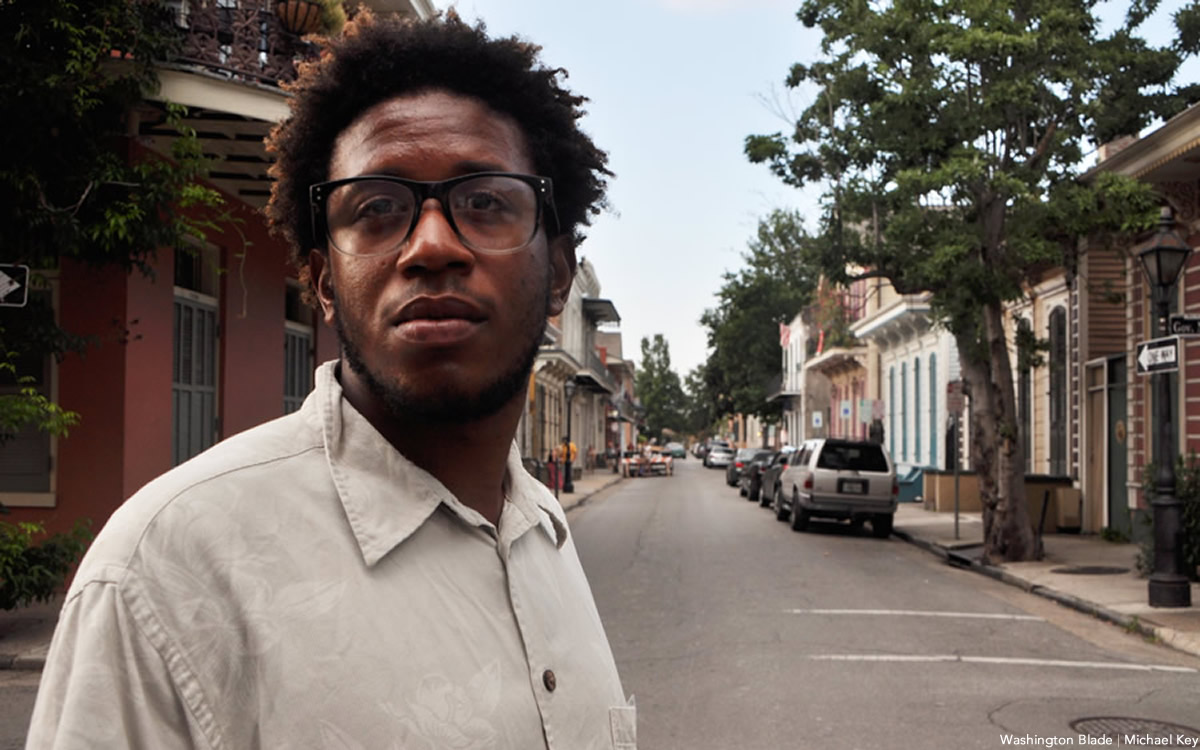
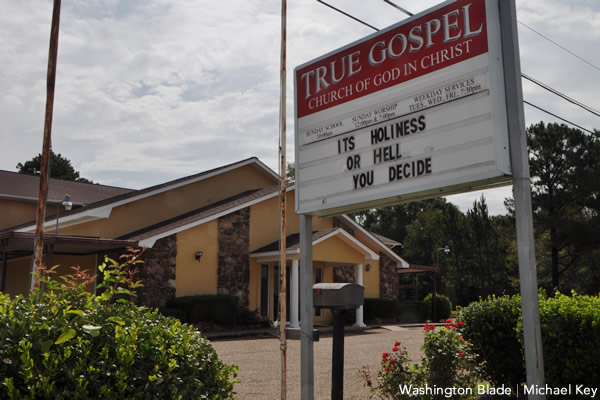
The True Gospel Church of God in Christ is near Jackson, Miss. (Washington Blade photo by Michael Key)
Blade reporter Michael K. Lavers and I earlier this year pitched the idea of going to Alabama, Louisiana and Mississippi to see what LGBT life is like in the South. Living in D.C., we wanted to see for ourselves just how different the experience was for our brothers and sisters who make their homes in places not known for LGBT inclusiveness. Our editor sent us out to gather stories and pictures. We had absolutely no idea what was in store for us.
The Dandelion Project
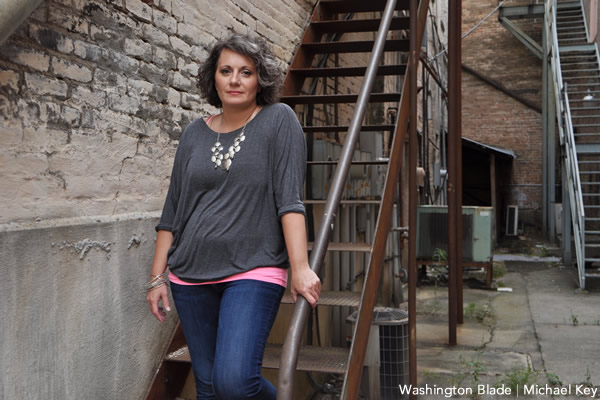
Dandelion Project founder Brandiilyne Dear met with the Washington Blade in Laurel, Miss. (Washington Blade photo by Michael Key)
Our first stop after landing at Medgar Evers International Airport in Jackson, the Mississippi state capital, was in Laurel, Miss. where we met with Dandelion Project founder Rev. Brandiilyne Dear. She told us about her life: how she had been addicted to meth, but then found a calling to the pulpit and got sober. She founded a ministry to help the many addicts who live in the Mississippi Pine Belt. Despite all that she had done through the years for her church, when it was found out that she was a lesbian, everyone — even her own family — turned against her and she “lost everything.”
Dear found her calling elsewhere with the Dandelion Project, a social support group and activist organization for LGBT people in Mississippi. She explained that dandelions are seen as weeds; something to be destroyed, yet are beautiful, ubiquitous and “a good thing.”
We spoke with members of the Dandelion Project, including several gender non-conforming youth who were eager to share their stories of social isolation and the violence and hatred they face.
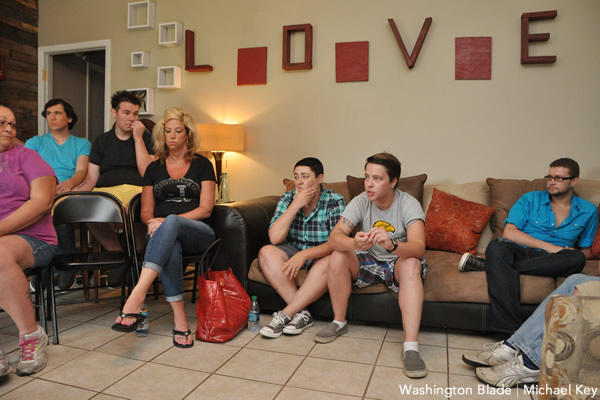
Members of the Dandelion Project meet in Dear’s Mississippi home. (Washington Blade photo by Michael Key)
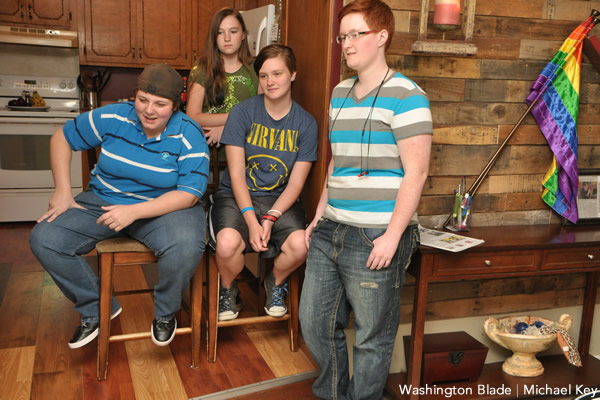
Members of the Dandelion Project gather to discuss issues in a home in Laurel, Miss. (Washington Blade photo by Michael Key)
Despite the daily discrimination they all said they experience, most members of the Dandelion project were proud to continue the fight for equality in their home state. One young person, however, who had just been through a harrowing run for her life from a group intent on doing her harm wished for Mississippi to “fall into the Gulf” of Mexico.
Mississippi Delta
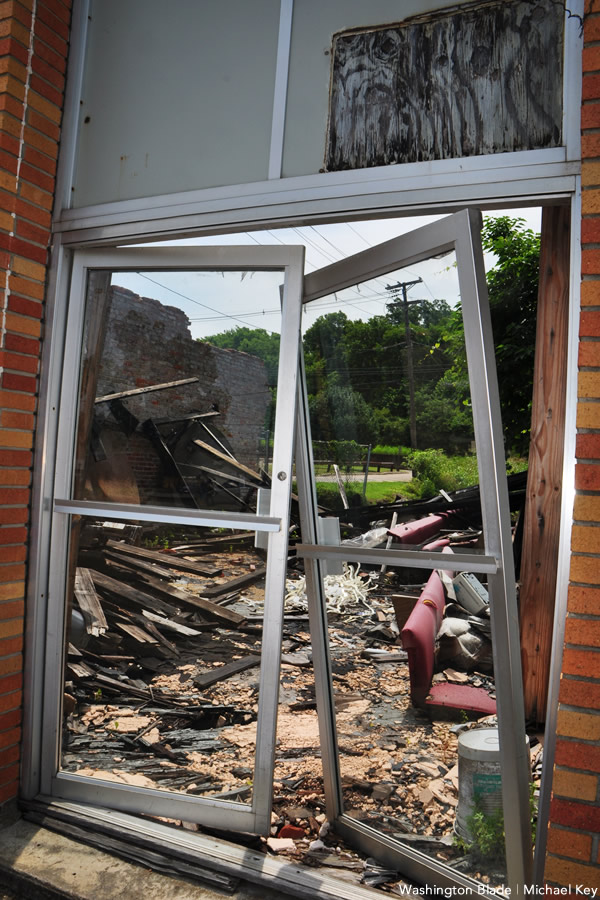
One of the many ruined structures along Main Street in Yazoo City, Miss. stands as a monument to the tornado which passed through the city four years ago. (Washington Blade photo by Michael Key)
Our next stop was in the verdant but poverty-stricken Mississippi Delta. After passing small farming towns and long stretches of countryside, we arrived at the “Gateway to the Delta,” Yazoo City, where we had an appointment with the newly elected Mayor Diane Delaware. A cosmopolitan woman who had worked “all around the world,” Delaware told us that she had “no problem” with same-sex marriage.
Yazoo City, and indeed the entire Mississippi Delta, seemed to have much bigger things to worry about than marriage equality. Abject poverty was compounded with joblessness to make for a grim future for many residents. A tornado had passed through Yazoo City four years before, leaving vast swaths of the city in ruins. The city didn’t have money or private investment to repair its downtown.
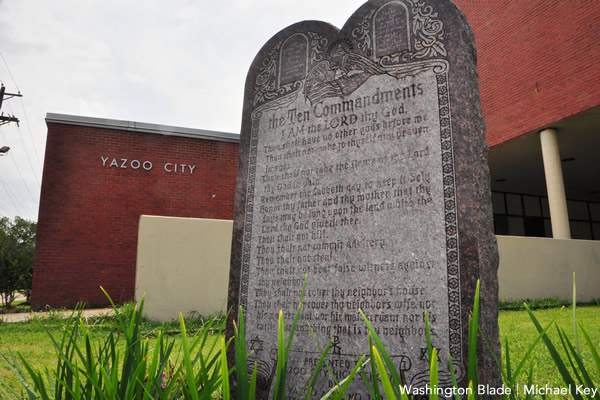
A Ten Commandments marker stands in front of Yazoo City Boys & Girls Club. Such markers are fairly common in Mississippi. (Washington Blade photo by Michael Key)
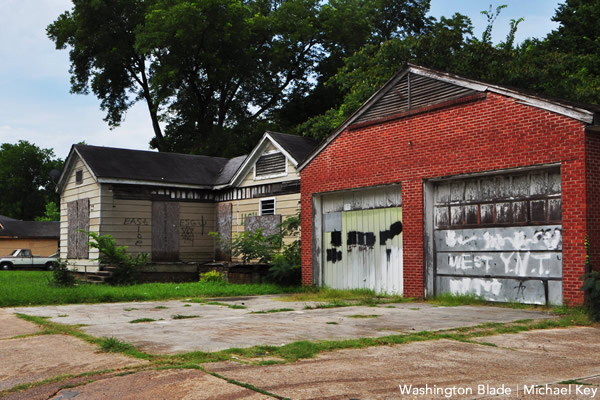
Several homes in Yazoo City, Miss. remain shuttered. (Washington Blade photo by Michael Key)
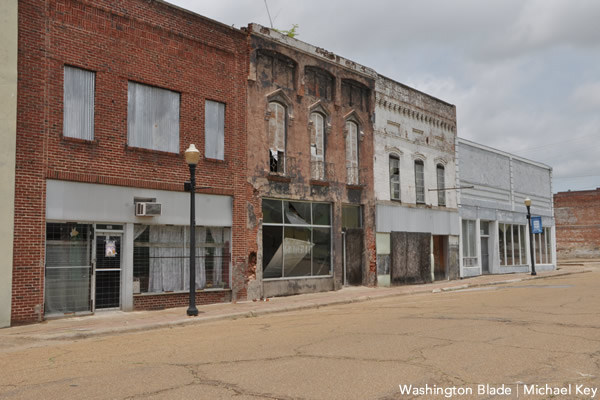
Blocks of Main Street, Yazoo City, Miss. remain largely abandoned. (Washington Blade photo by Michael Key)
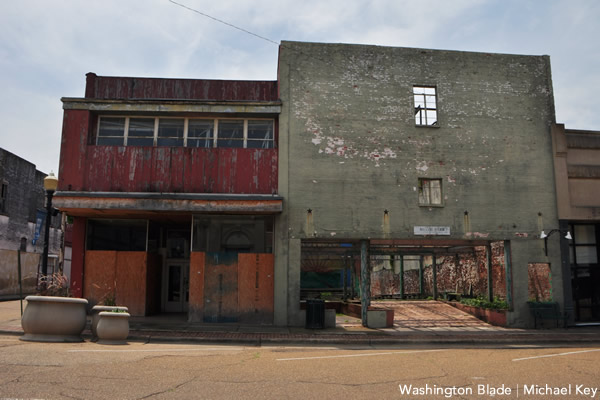
A tornado devastated Main Street, Yazoo City, Miss. four years ago. (Washington Blade photo by Michael Key)
We drove deep into the Mississippi Delta to Greenville on the the Mississippi River. There, we met with an out school teacher, Ryvell Fitzpatrick.
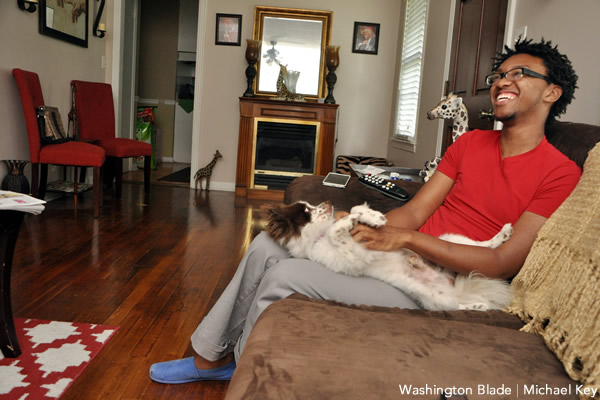
Ryvell Fitzpatrick is a teacher in Greenville, Miss. (Washington Blade photo by Michael Key)
The reluctant pioneer described his life to us as someone who has managed to thrive, despite the difficulties.
We Don’t Discriminate Campaign
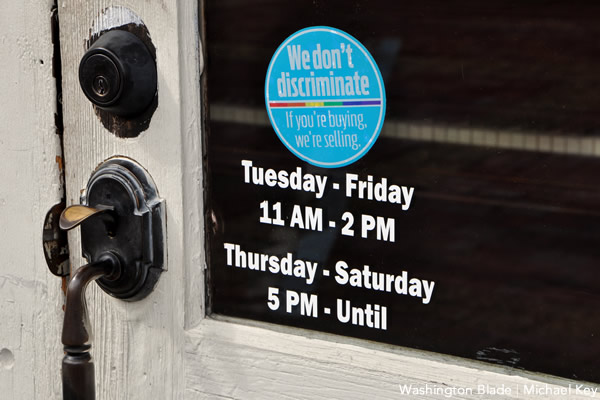
A Mississippi law that opponents argue allows business owners to deny services to LGBT people based on their religious beliefs took effect on July 1. (Washington Blade photo by Michael Key)
Back in Laurel, Dear pointed out the “We Don’t Discriminate” signs on select local businesses. The signs had been placed in store windows following the passage of SB-2681 — the Mississippi Religious Freedom Restoration Act, or so-called “Turn Away the Gays Bill.”
We went to Jackson to track down the organizers of the We Don’t Discriminate Campaign.
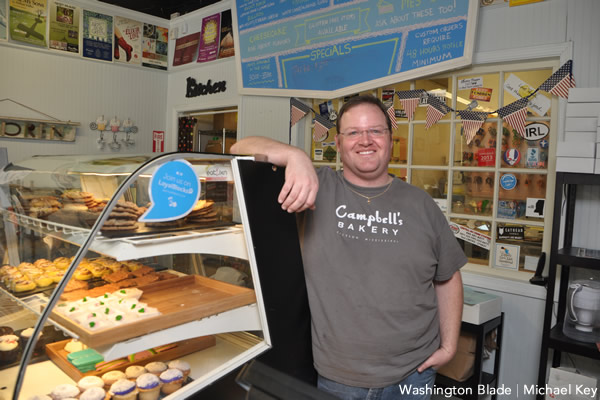
Campbell’s Bakery owner Mitchell Moore is the founder of the ‘We Don’t Discriminate’ campaign. (Washington Blade photo by Michael Key)
We spoke with the founder: a self-described “straight, married, Republican, Christian” entrepreneur named Mitchell Moore who was disgusted that his bakery, the only wedding cake bakery within the Jackson city limits, would be used as a rallying cry for homophobes in the state Senate to justify the anti-gay bill. Following the interview, Moore gave us a large box of confections.
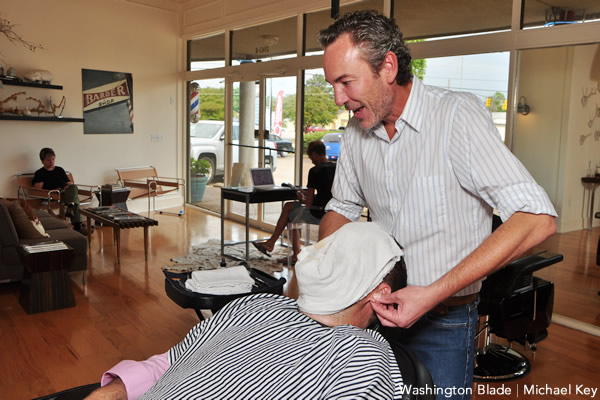
Eddie Outlaw owns a barbershop and salon in Jackson, Miss. (Washington Blade photo by Michael Key)
My reporter traveling companion got a beard trim as he interviewed salon and barbershop owner Eddie Outlaw. Outlaw and his husband Justin McPherson, the subjects of the documentary, “A Mississippi Love Story,” told us about their involvement in the campaign.
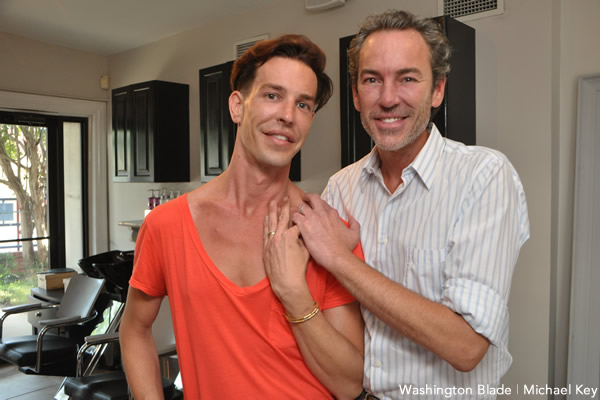
Justin McPherson Outlaw and Eddie Outlaw, owners of a hair salon and barber shop in Jackson, Miss., married in California last year. (Washington Blade photo by Michael Key)
We met with a group of LGBT rights advocates who spent their evening drinking beer, eating hors d’oeuvres and stuffing envelopes with “We Don’t Discriminate” stickers.
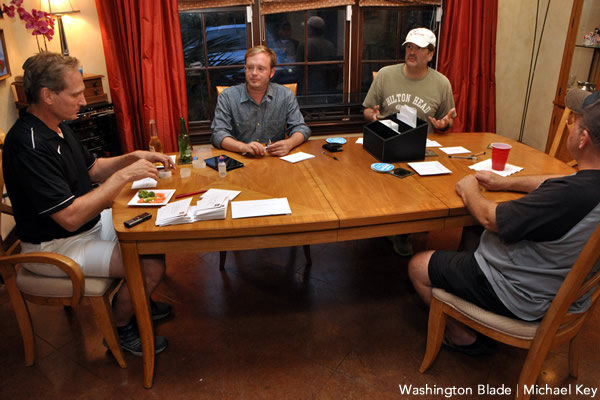
Activists in Jackson, Miss. fill envelopes with ‘We Don’t Discriminate’ literature. (Washington Blade photo by Michael Key)
They were all excited by the success of the campaign in generating buzz around the nation, and hopeful about change to come.
Late at night, we met with performance artist Constance Gordon in the dressing room of a club frequented by LGBT people of color. She explained to us the intersection of race, class and gender and other dynamics in play in Mississippi. Like most we spoke with, she was proud to be from Mississippi, though she acknowledged the rampant discrimination that LGBT people face in her home state.
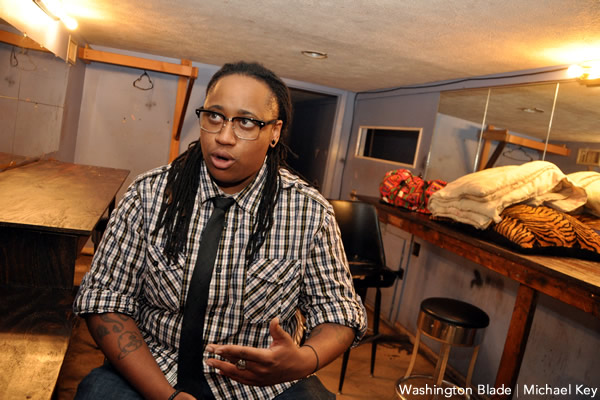
Constance Gordon is a performance artist and promoter in Jackson, Miss. (Washington Blade photo by Michael Key)
The next day, before moving on to Louisiana, we met with HIV/AIDS service providers and advocates at Open Arms Healthcare Center in Jackson. We met the “AIDS Lady,” as she referred to herself, Charlotte “Dot” Norwood. She told us of the struggles that many clients face, including accessing healthcare, finding jobs and even getting enough to eat.
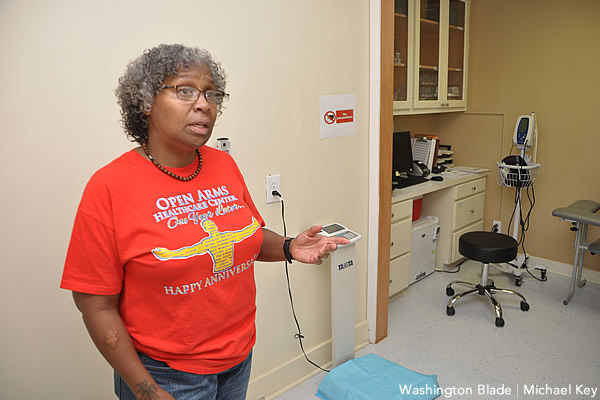
Charlotte “Dot” Norwood has spent years in the fight against HIV/AIDS. (Washington Blade photo by Michael Key)
We also had the pleasure of meeting client-turned-advocate Antwan Matthews. He related to us his story of being a great student but being kicked out of his home when his family found out that he is gay and HIV positive. Despite all of that, he managed to become a peer HIV educator and put himself through college. He is looking forward to graduating with a degree in biology soon.
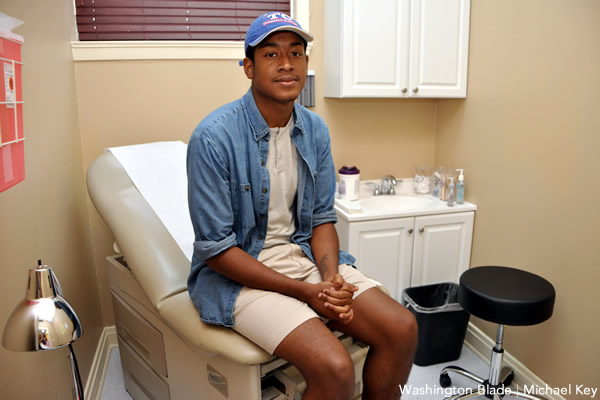
Antwan Matthews is a student and peer HIV educator. (Washington Blade photo by Michael Key)
Baton Rouge
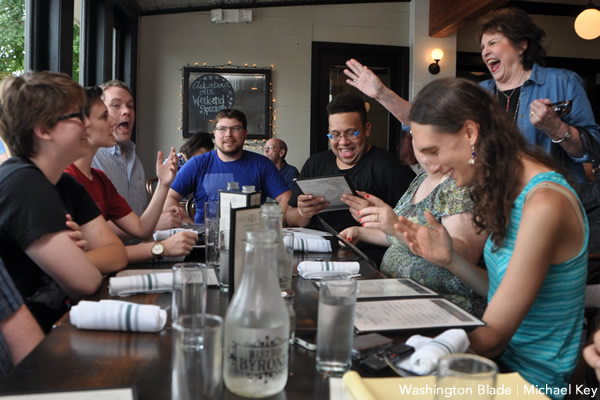
Carol Frazier, on upper right, greets fellow LGBT rights advocates at a restaurant in Baton Rouge, La., on July 12, 2014. (Washington Blade photo by Michael Key)
We left Mississippi behind and drove south to Baton Rouge. We stopped at Bistro Byronz to meet with members of PFLAG Baton Rouge, Equality Louisiana, Louisiana Trans Advocates and Baton Rouge Pride. Michael tried to start the interviews, but the ebullient Carol Frazier of PFLAG insisted that in the South, people eat together before they get down to business. We polished off our crawfish étouffée and listened to stories from the gathered activists about their lives and work.
Many of those gathered at our table struggled with poverty and employment, like transgender woman Ksaa Zair who had difficulty in finding a job because of her gender presentation and had to resort to illegally attaining hormones over the Internet because she could not afford proper medical care in the U.S., or her roommate Sergio Oramas who worked as many overtime hours as he could at a warehouse, yet struggled to pay rent.
Other advocates we spoke with dealt with loss, like Frazier: her gay son had committed suicide. She then dedicated her life to helping LGBT people as the president of PFLAG Baton Rouge until health issues forced her to take a less active role.
All of the assembled activists had come together as a close-knit community. After Hurricane Katrina, tens of thousands of people moved to Baton Rouge and the nascent LGBT community began to solidify. The city’s first Pride celebration was held in 2007, organized by Tom Merrill and other members of Baton Rouge Pride.
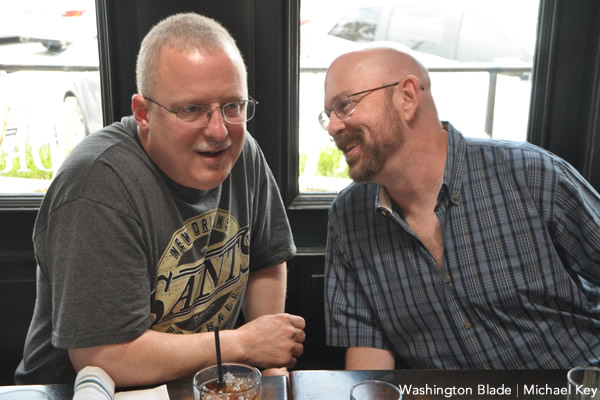
From left; Tom Merrill and Rick Cain are organizers of Baton Rouge Pride. (Washington Blade photo by Michael Key)
After many hugs and farewells to our friendly dining companions, Michael and I left the sweltering heat of Baton Rouge and drove through the swamps of Louisiana to New Orleans.
New Orleans
After spending an evening touring the French Quarter and sampling crawfish pie and signature “hand grenade” drinks on Bourbon Street, Michael and I got some much-needed rest.
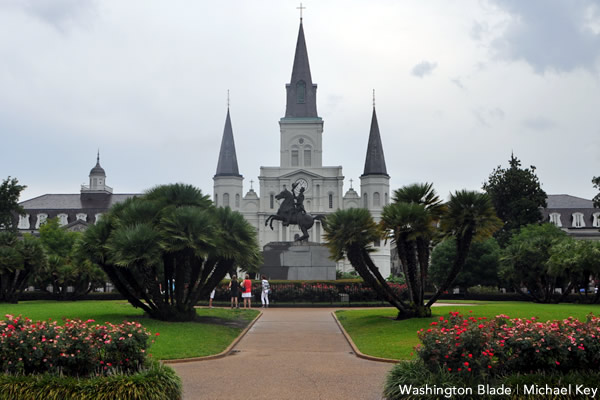
The St. Louis Cathedral in the French Quarter of New Orleans is a spot popular with tourists. (Washington Blade photo by Michael Key)
The next day, we met with activists in Metairie, La. who told us of the ups and downs of LGBT life in the New Orleans area. PFLAG New Orleans Co-President Julie Thompson, who had lost her gay son due to a medical emergency in the middle of a hurricane, beamed proudly about the time she went to Southern Decadence with him and how nice everyone was to her at gay bars. She, and the others gathered, spoke of how different everything was after Katrina and how the once-vibrant LGBT community of New Orleans was only now getting to where it was before the levees burst.
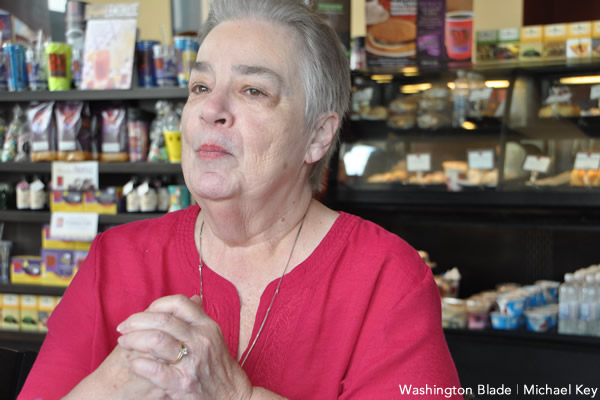
Co-President of PFLAG New Orleans Julie Thompson recalled many happy memories with her late gay son. (Washington Blade photo by Michael Key)
Louisiana Trans Advocates President Elizabeth Anne Jenkins told us how the destruction of the city meant the wholesale dismantling of an infrastructure for support for the local trans population, from doctors to support networks.
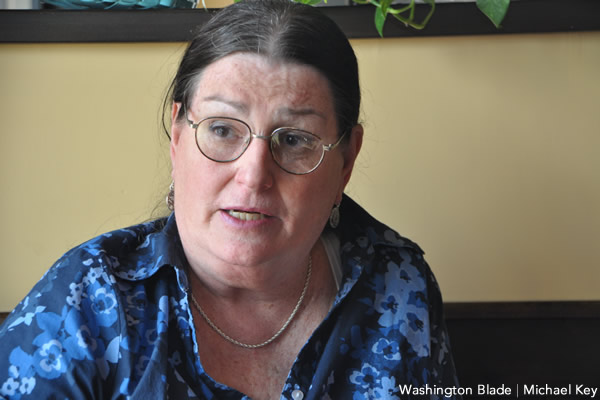
Elizabeth Anne Jenkins is the president of Louisiana Trans Advocates. (Washington Blade photo by Michael Key)
Michael and I wanted to see the devastated Lower Ninth Ward for ourselves. There were rows and rows of foundations with no houses, empty streets with only weeds on the block. But there were bright spots. The Make It Right Foundation had rebuilt a portion of the neighborhood with gleaming, eco-friendly, hurricane resistant homes.
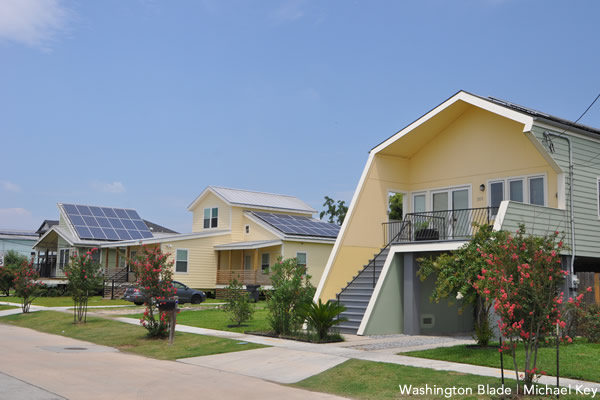
Several eco-friendly homes have been built in the Lower Ninth Ward. (Washington Blade photo by Michael Key)
But, it only took a trip across the bridge to the Upper Ninth Ward to see that the region is far from recovered. Many homes remain boarded shut, overgrown with creeping vines.
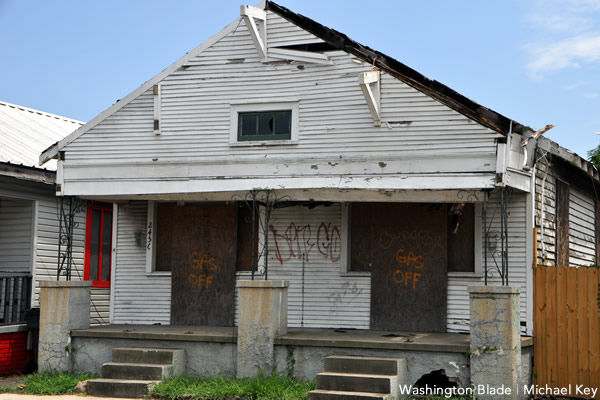
Several homes remain shuttered in the Upper Ninth Ward of New Orleans nine years after Katrina. (Washington Blade photo by Michael Key)
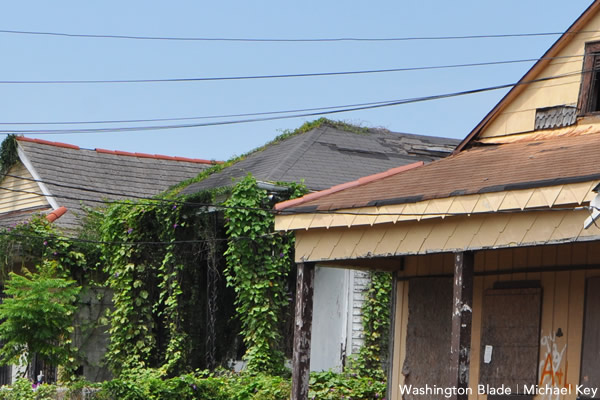
Homes in the Upper Ninth Ward of New Orleans have been reclaimed by nature and sit abandoned. (Washington Blade photo by Michael Key)
HIV in New Orleans
That evening, we met with peer educator Timothy Thompson of the New Orleans AIDS Task Force for dinner in the French Quarter. He told us of the problem of the stigma of an HIV-positive diagnosis driving many to avoid being tested. Many misconceptions about HIV/AIDS persist among people that Thompson had met with, including fears that HIV could be spread by sharing a meal.
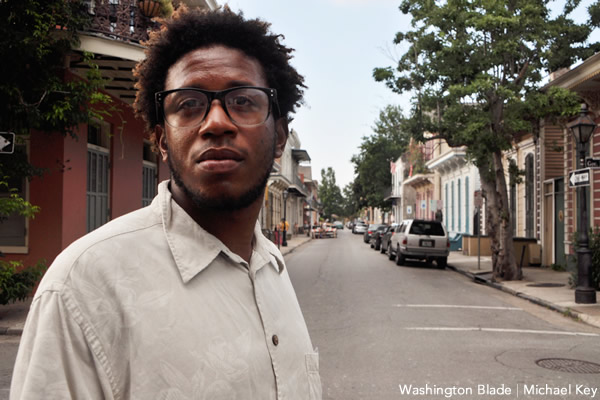
Timothy Thompson is a peer educator with New Orleans AIDS Task Force. (Washington Blade photo by Michael Key)
In the morning, we made our last stop in New Orleans: Belle Reve. Belle Reve is a residence for people with HIV that provides medical care and helps residents to get back on their feet. Vicki Weeks, its executive director, told us of all of the programs offered at the center and proudly guided us around. She, and other staff and residents, had been through a traumatic several months living as refugees in the aftermath of Katrina. But the center is now restored and provides life-saving treatment to people who are often at the end of their rope.
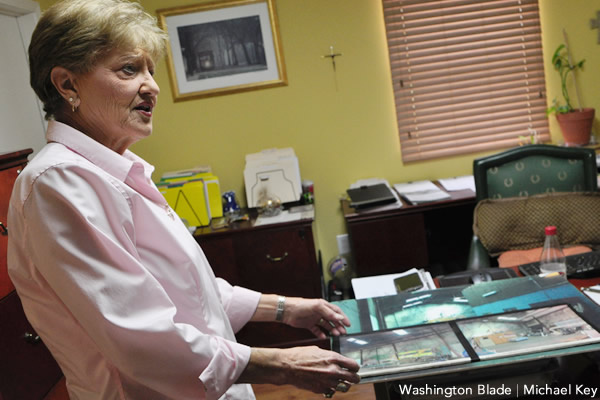
Belle Reve Executive Director Vicki Weeks shows photos of the hurricane damage to the Belle Reve facility. (Washington Blade photo by Michael Key)
One such resident was Carl Green who had lost his job after it was discovered that he was HIV positive. He became homeless and without access to medical treatment, deteriorated rapidly. Belle Reve took him in and nursed him back to health.
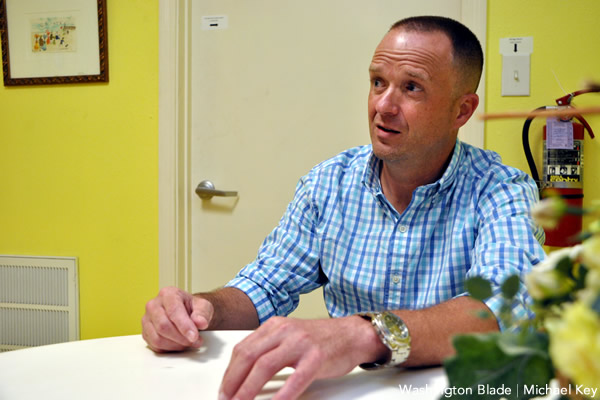
Carl Green is a resident at Belle Reve. (Washington Blade photo by Michael Key)
We also met with Miss Eddie who had ridden out Katrina in New Orleans before becoming a resident at Belle Reve.
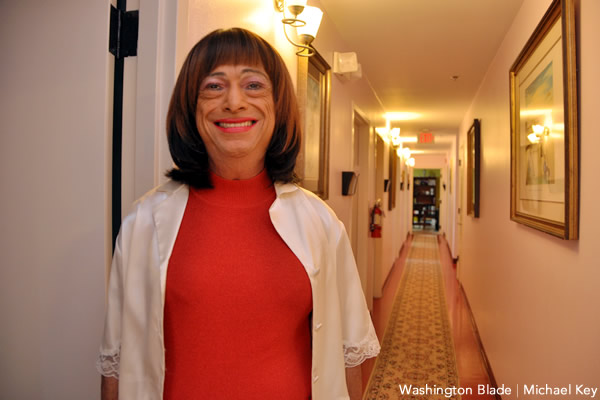
Miss Eddie told the Blade, ‘It’s a great blessing being here,’ in the Belle Reve facility in New Orleans. (Washington Blade photo by Michael Key)
Gulf Coast
We left New Orleans and drove to the Mississippi Gulf Coast. Where houses once stood along the shore, now only foundations remained. Many had rebuilt, but the scars of the hurricane were ever present.
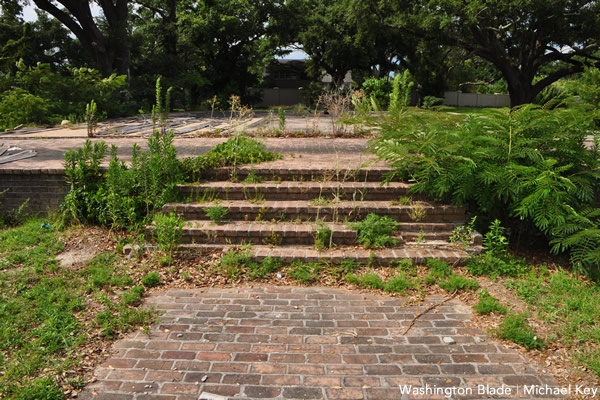
Foundations are all that remain of many homes along the Gulf Coast in Gulfport, Miss., destroyed during Hurricane Katrina. (Washington Blade photo by Michael Key)
Our first stop on the coast was to meet Jeff White and John Perkins, co-founders of the Mississippi Gulf Coast Lesbian and Gay Community Center. We shared queso and a margarita with them at a Mexican restaurant in Gulfport. They told us of how it was difficult for LGBT people to be out in any capacity in the area. They were even worried that the people in the restaurant might be looking at us. White then related a horrifying story about how he had been repeatedly raped by a teacher at his private Baptist school as an openly gay teenager to make him “hate men and change.”
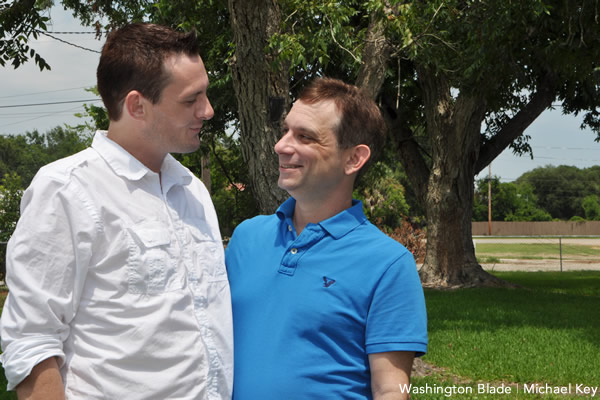
Jeff White and John Perkins are the co-founders of the Mississippi Gulf Coast Lesbian and Gay Community Center. (Washington Blade photo by Michael Key)
We drove along the coast to a mall in nearby Biloxi, where we met with Jennifer and Jena Pierce and a trans man who preferred to remain anonymous. The Pierces married in Connecticut last December, yet lived in Mississippi. They had considered moving to a place more accepting of their relationship, but decided to stay for the sake of their young daughter who is in school. The married couple had faced discrimination on a number of occasions. Jena Pierce told us that an employee at the DMV office loudly gathered her coworkers and told her she could not change the last name on her driver’s license because the state would not recognize her marriage. The DMV worker proceeded to publicly embarrass her, leaving her sobbing in her car.
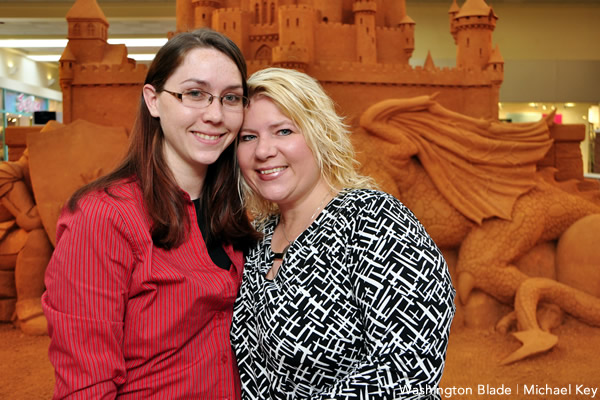
Jennifer and Jena Pierce are a married couple in Biloxi, Miss. (Washington Blade photo by Michael Key)
Jennifer Pierce had also experienced discrimination when trying to take a family leave day to take their daughter to the doctor’s office. Her workplace wouldn’t let her go because their daughter isn’t her biological daughter — even though the people making the decision had been guests at the Pierces’ wedding reception.
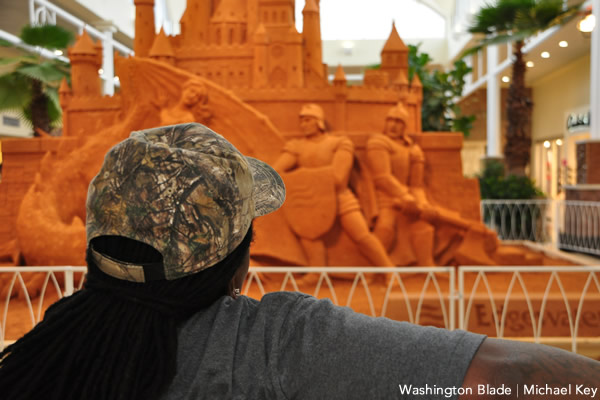
A trans man on the Gulf Coast preferred to remain anonymous but spoke to the Blade about his experience as a trans man living on the Gulf Coast. (Washington Blade photo by Michael Key)
Alabama
It was in the early evening when we pulled into the parking lot of Laps on the Causeway, a sprawling restaurant along a thin stretch of land in the middle of Mobile Bay. Michael and I battled a swarm of gnats to meet with Lane Galbraith on the outdoor deck of his favorite restaurant. The trans man who had founded LGBT Wave of Hope, a Mobile LGBT advocacy organization, told us of the pervasive closet of Alabama and the struggles of the LGBT people who live there.
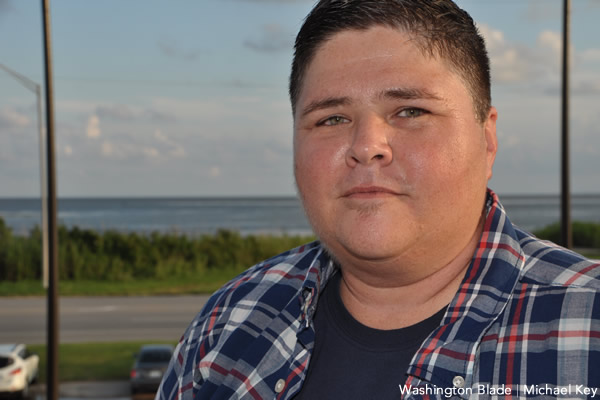
Lane Galbraith is the founder of LGBT Wave of Hope in Mobile, Ala. (Washington Blade photo by Michael Key)
Our final leg of the trip was something that I had been looking forward to for weeks. We drove to Montgomery, Ala. to visit the Southern Poverty Law Center (SPLC). There was as much security at the SPLC as one would expect at the White House. After passing through many checkpoints, I wasn’t even allowed to take pictures inside the massive building. The SPLC’s precautions were well-founded however, as the watchdog organization had been targeted many times by hate groups resulting in fire bombings. We visited the Civil Rights Memorial and got background on the SPLC’s LGBT-specific cases. We met with SPLC lawyers David Dinielli and Sam Wolfe who specialize in LGBT issues.
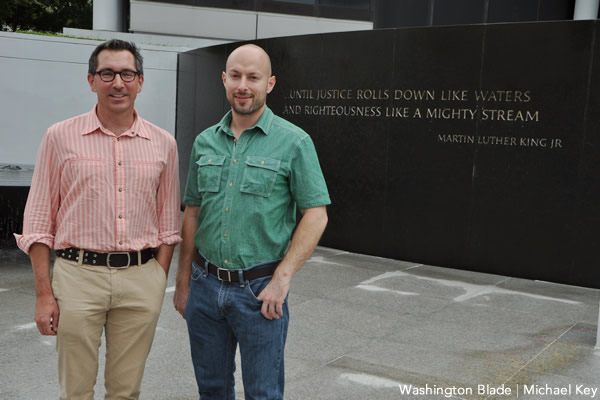
Southern Poverty Law Center Deputy Legal Director David Dinielli and lawyer Sam Wolfe met with the Washington Blade at the Civil Rights Memorial in Montgomery, Ala. (Washington Blade photo by Michael Key)
After meeting with the lawyers, we were granted a visit to the SPLC’s Civil Rights Museum. Upon seeing a display that related the horrifying death of a man in an anti-gay attack, my traveling companion started sobbing. I felt a strange confluence of emotions from the mental and emotional toll our trip had taken as well. After we left the museum, we walked in silence around Montgomery. Signs of the Confederacy were all around us, including the Confederate “White House” of Jefferson Davis.

The circular Civil Rights Memorial in Montgomery, Ala. lists martyrs to the cause of civil rights, with a blank spot left for people who came before and those who are yet to come. (Washington Blade photo by Michael Key)
On the last day of our trip, Michael and I were both mentally exhausted, but we had one more important person to talk with. Kathie Heirs of AIDS Alabama met us in her offices in Birmingham to talk about the strides made in combatting the HIV/AIDS epidemic in the state.
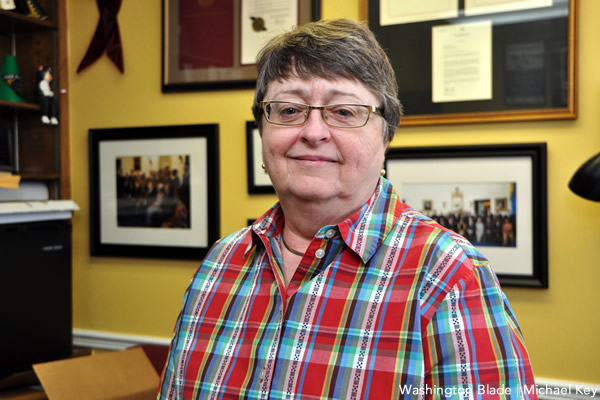
Kathie Hiers is the CEO of AIDS Alabama. (Washington Blade photo by Michael Key)
Michael and I dropped off the rental car at the airport in Birmingham and had a silent drink together while waiting on our flight back to D.C. The many stories I had heard were swirling around in my head and I was too close to it then to make sense of it. I did know two things: I would never take living in a place like Washington for granted again and I would never again succumb to the comforting lie that our full equality had already been won nationwide. The people we had met in the South were amazing and courageous and had built a community in difficult circumstances. Most all of the people we had spoken with had a sense of pride of place and felt a duty to make their town or city a more welcoming home for the next generation of LGBT people.
a&e features
Doug Spearman takes his chance
‘Noah’s Arc: The Movie’ debuted on Paramount+ last month

There’s no question that when Patrik-Ian Polk’s series “Noah’s Arc” premiered on Logo 20 years ago, it was a groundbreaking creation. The story of a group of Black gay men and their wonderful friendship. The titular arc was that of the cute main character, Noah (Darryl Stephens), and his close-knit circle of friends, including Chance played by gay actor Doug Spearman. This compelling and loving fraternity may, in fact, be what brought viewers back repeatedly, including a 2008 movie, “Noah’s Arc: Jumping the Broom,” as well as the 2020 “Noah’s Arc” short, and now, a new full-length feature “Noah’s Arc: The Movie,” debuting on Paramount+ on June 20. In the movie, filled with equal measures of laughs and tears, Chance, who has faced a devastating loss, finds his dependable friends there, ready to support and comfort him at a moment’s notice. I had the pleasure of speaking with Spearman the morning of the streaming premiere of “Noah’s Arc: The Movie.”
WASHINGTON BLADE: Doug, since the early 2000s, when the “Noah’s Arc” series premiered on Logo, you have been playing the character of Chance, including in the latest installment, “Noah’s Arc: The Movie.” What was it about Chance that appealed to you as an actor?
SPEARMAN: When Patrik (-Ian Polk) called me to ask me to play him (Chance), I was at JFK airport in the baggage claim, waiting for a suitcase. He explained what the part was. The thing that stuck out to me was the fact that Chance was in a long-term relationship with another Black man. And, they had a child; they had a 4-year-old daughter named Kenya. I had never seen two Black gay men raise a child on TV before. I thought it was the most revolutionary thing I’d ever seen. I immediately thought I’ve got to do this because that was something nobody had seen. I thought it was incredibly important to take the part.
BLADE: “Noah’s Arc: The Movie” was, once again, written and directed by Patrik-Ian Polk, who you just mentioned, is the creator of the entire franchise. What’s the secret to your long-standing working relationship?
SPEARMAN: [Laughs] the whole team, all of us, are like a band of brothers. We fight like brothers, we come together like brothers, we hash things out, we talk, because we’re all very different from our characters. I think the challenge of playing these guys and then uplifting these men, playing a part, especially something written by Patrik, is like solving a math equation. There’s always a challenge that’s enjoyable for me as an actor: to try to find out what it is that Patrik wants, and then how do I do it.
BLADE: I think you do a very good job of it.
SPEARMAN: Thank you very much
BLADE: In the years between “Jumping the Broom” and the new full-length movie, many changes have occurred, and the story addresses some of them, including gay widowhood, which is something that the aging community is now confronting, as well as mental health issues. Please say a few words about how you approached those subjects in the new movie.
SPEARMAN: I had a lot of loss in my life, right before we started shooting. Two months before we started shooting the first series, my mother died. I was going through the grief process through that whole first season. Since then, I’ve lost a lot of people in my life. In fact, when we started shooting the second season, the second week we were shooting, my ex died of a heart attack. I was having to fold that into what I was doing with my life on the set and off the set. You’ve got to show up and you’ve got to do your work. The first two seasons of “Noah’s Arc” are always tinged with the memory of grief. So, when I had to deal with the death that Chance faces (in the new movie), which is a significant death in his life, it wasn’t that hard to reach back, especially the scene in the graveyard. It was something that I unfortunately could pull from personal experience.
BLADE: Shifting gears, the movie features delightful cast surprises, including Jasmine Guy and TS Madison. Did you have a chance to interact with either or both when they were on set?
SPEARMAN: No, I didn’t have any scenes with Jasmine, and I missed her. I wish I had gotten to see her because I actually got to direct Jasmine for a CBS promo shoot for “Queen,” back in the early ‘90s. I had a huge crush on her when she was on “A Different World.” So, I really would have liked to reconnect. But TS and I got to see each other every day because I was in all her scenes. It was extraordinary being around somebody like that. That is one outspoken woman!
BLADE: Even though Beyoncé never makes an appearance in the movie, there’s a lot of talk about her. Would you say you are a Beyoncé fan?
SPEARMAN: Yes! I’m breathing! Yes, I’m a Beyoncé fan. I actually got the chance to meet her. I knew her mom. Her mom was extraordinary to me. She is in the second movie I directed. She also gave us a wedding gown to use in the very first scene of the movie. That family is extraordinarily important to me. Not only just to be a fan, but to be somebody who’s gotten to know them and work with them and see how hard they work. I don’t think anybody works as hard as Tina or Beyoncé.
BLADE: There was a recent news item about gay actor Benito Skinner of the Amazon Prime series “Overcompensating” being told not to bother auditioning for straight roles. As an out actor yourself, how important do you think it is for queer characters to be portrayed by queer actors, and vice versa?
SPEARMAN: Being queer is a multifaceted identity. There’s no one kind of queer person. I think finding the best actor that’s your first circle of casting. I think one of the joys about being an actor is that you get to play different parts. I play straight guys all the time. Dads and husbands and things like that. I think a lot of people are told not to do it. In fact, I wouldn’t be Chance if the actor who was originally cast as Chance hadn’t been pulled out of the series by his agents because they didn’t want him to play a gay character.
BLADE: That’s amazing! Thank you for sharing that. Without giving away too much, the ending of the movie is a little ambiguous, even ending with a question mark. If there was a “Noah’s Arc: The Movie” sequel, would you come back for that?
SPEARMAN: Yeah! A lot of it would depend on what Chance’s journey is going to be like. Patrik and I have conversations like that all the time. He’s very interested and supportive of input. I hope I would be, as we all would be, part of the creative growth with these characters. They live in Patrik’s head, and he writes them, but we’re the ones who have to flesh them out. It’s a conversation, it’s always a conversation.
BLADE: You are currently performing in Molière’s “The Imaginary Invalid” as part of the New Orleans Shakespeare Festival at Tulane. What has this experience been like for you?
SPEARMAN: It’s extraordinary! I started on stage when I was seven. There’s nothing like working with a live audience and having that immediacy. I’m working with an extraordinarily talented cast in a really great play, and I have some of the best scene partners I could ever want.
BLADE: Are there any upcoming film or TV projects you’d like to mention?
SPEARMAN: I’m still a writer, and I’m still a director, and I’ve still got scripts that I would like to make. I have a little something that’s a cross between “Treme” and “Bridgerton” that I want to do. I’m always trying to figure out what the next thing is.
a&e features
Visit Cambridge, a ‘beautiful secret’ on Maryland’s Eastern Shore
New organization promotes town’s welcoming vibe, LGBTQ inclusion

CAMBRIDGE, Md. — Driving through this scenic, historic town on Maryland’s Eastern Shore, you’ll be charmed by streets lined with unique shops, restaurants, and beautifully restored Victorian homes. You’ll also be struck by the number of LGBTQ Pride flags flying throughout the town.
The flags are a reassuring signal that everyone is welcome here, despite the town’s location in ruby red Dorchester County, which voted for Donald Trump over Kamala Harris by a lopsided margin. But don’t let that deter you from visiting. A new organization, Proudly Cambridge, is holding its debut Pride event this weekend, touting the town’s welcoming, inclusive culture.
“We stumbled on a beautiful secret and we wanted to help get the word out,” said James Lumalcuri of the effort to create Proudly Cambridge.
The organization celebrates diversity, enhances public spaces, and seeks to uplift all that Cambridge has to share, according to its mission statement, under the tagline “You Belong Here.”
The group has so far held informal movie nights and a picnic and garden party; the launch party is June 28 at the Cambridge Yacht Club, which will feature a Pride celebration and tea dance. The event’s 75 tickets sold out quickly and proceeds benefit DoCo Pride.
“Tickets went faster than we imagined and we’re bummed we can’t welcome everyone who wanted to come,” Lumalcuri said, adding that organizers plan to make “Cheers on the Choptank” an annual event with added capacity next year.
One of the group’s first projects was to distribute free Pride flags to anyone who requested one and the result is a visually striking display of a large number of flags flying all over town. Up next: Proudly Cambridge plans to roll out a program offering affirming businesses rainbow crab stickers to show their inclusiveness and LGBTQ support. The group also wants to engage with potential visitors and homebuyers.
“We want to spread the word outside of Cambridge — in D.C. and Baltimore — who don’t know about Cambridge,” Lumalcuri said. “We want them to come and know we are a safe haven. You can exist here and feel comfortable and supported by neighbors in a way that we didn’t anticipate when we moved here.”

Lumalcuri, 53, a federal government employee, and his husband, Lou Cardenas, 62, a Realtor, purchased a Victorian house in Cambridge in 2021 and embarked on an extensive renovation. The couple also owns a home in Adams Morgan in D.C.
“We saw the opportunity here and wanted to share it with others,” Cardenas said. “There’s lots of housing inventory in the $300-400,000 range … we’re not here to gentrify people out of town because a lot of these homes are just empty and need to be fixed up and we’re happy to be a part of that.”
Lumalcuri was talking with friends one Sunday last year at the gazebo (affectionately known as the “gayzebo” by locals) at the Yacht Club and the idea for Proudly Cambridge was born. The founding board members are Lumalcuri, Corey van Vlymen, Brian Orjuela, Lauren Mross, and Caleb Holland. The group is currently working toward forming a 501(c)3.
“We need visibility and support for those who need it,” Mross said. “We started making lists of what we wanted to do and the five of us ran with it. We started meeting weekly and solidified what we wanted to do.”
Mross, 50, a brand strategist and web designer, moved to Cambridge from Atlanta with her wife three years ago. They knew they wanted to be near the water and farther north and began researching their options when they discovered Cambridge.
“I had not heard of Cambridge but the location seemed perfect,” she said. “I pointed on a map and said this is where we’re going to move.”
The couple packed up, bought a camper trailer and parked it in different campsites but kept coming back to Cambridge.
“I didn’t know how right it was until we moved here,” she said. “It’s the most welcoming place … there’s an energy vortex here – how did so many cool, progressive people end up in one place?”
Corey van Vlymen and his husband live in D.C. and were looking for a second home. They considered Lost River, W.Va., but decided they preferred to be on the water.
“We looked at a map on both sides of the bay and came to Cambridge on a Saturday and bought a house that day,” said van Vlymen, 39, a senior scientist at Booz Allen Hamilton. They’ve owned in Cambridge for two years.
They were drawn to Cambridge due to its location on the water, the affordable housing inventory, and its proximity to D.C.; it’s about an hour and 20 minutes away.
Now, through the work of Proudly Cambridge, they hope to highlight the town’s many attributes to residents and visitors alike.
“Something we all agree on is there’s a perception problem for Cambridge and a lack of awareness,” van Vlymen said. “If you tell someone you’re going to Cambridge, chances are they think, ‘England or Massachusetts?’”
He cited the affordability and the opportunity to save older, historic homes as a big draw for buyers.
“It’s all about celebrating all the things that make Cambridge great,” Mross added. “Our monthly social events are joyful and celebratory.” A recent game night drew about 70 people.
She noted that the goal is not to gentrify the town and push longtime residents out, but to uplift all the people who are already there while welcoming new visitors and future residents.
They also noted that Proudly Cambridge does not seek to supplant existing Pride-focused organizations. Dorchester County Pride organizes countywide Pride events and Delmarva Pride was held in nearby Easton two weeks ago.
“We celebrate all diversity but are gay powered and gay led,” Mross noted.
To learn more about Proudly Cambridge, visit the group on Facebook and Instagram.
What to see and do
Cambridge, located 13 miles up the Choptank River from the Chesapeake Bay, has a population of roughly 15,000. It was settled in 1684 and named for the English university town in 1686. It is home to the Harriet Tubman Museum, mural, and monument. Its proximity to the Blackwater National Wildlife Refuge makes it a popular stop for birders, drawn to more than 27,000 acres of marshland dubbed “the Everglades of the north.”
The refuge is walkable, bikeable, and driveable, making it an accessible attraction for all. There are kayaking and biking tours through Blackwater Adventures (blackwateradventuresmd.com).
Back in town, take a stroll along the water and through historic downtown and admire the architecture. Take in the striking Harriet Tubman mural (424 Race St.). Shop in the many local boutiques, and don’t miss the gay-owned Shorelife Home and Gifts (421 Race St.), filled with stylish coastal décor items.
Stop for breakfast or lunch at Black Water Bakery (429 Race St.), which offers a full compliment of coffee drinks along with a build-your-own mimosa bar and a full menu of creative cocktails.
The Cambridge Yacht Club (1 Mill St.) is always bustling but you need to be a member to get in. Snapper’s on the water is temporarily closed for renovations. RaR Brewing (rarbrewing.com) is popular for craft beers served in an 80-year-old former pool hall and bowling alley. The menu offers burgers, wings, and other bar fare.
For dinner or wine, don’t miss the fantastic Vintage 414 (414 Race St.), which offers lunch, dinner, wine tasting events, specialty foods, and a large selection of wines. The homemade cheddar crackers, inventive flatbreads, and creative desserts (citrus olive oil cake, carrot cake trifle) were a hit on a recent visit.
Also nearby is Ava’s (305 High St.), a regional chain offering outstanding Italian dishes, pizzas, and more.
For something off the beaten path, visit Emily’s Produce (22143 Church Creek Rd.) for its nursery, produce, and prepared meals.
“Ten minutes into the sticks there’s a place called Emily’s Produce, where you can pay $5 and walk through a field and pick sunflowers, blueberries, you can feed the goats … and they have great food,” van Vlymen said.
As for accommodations, there’s the Hyatt Regency Chesapeake Bay (100 Heron Blvd. at Route 50), a resort complex with golf course, spa, and marina. Otherwise, check out Airbnb and VRBO for short-term rentals closer to downtown.
Its proximity to D.C. and Baltimore makes Cambridge an ideal weekend getaway. The large LGBTQ population is welcoming and they are happy to talk up their town and show you around.
“There’s a closeness among the neighbors that I wasn’t feeling in D.C.,” Lumalcuri said. “We look after each other.”
a&e features
James Baldwin bio shows how much of his life is revealed in his work
‘A Love Story’ is first major book on acclaimed author’s life in 30 years

‘Baldwin: A Love Story’
By Nicholas Boggs
c.2025, FSG
$35/704 pages
“Baldwin: A Love Story” is a sympathetic biography, the first major one in 30 years, of acclaimed Black gay writer James Baldwin. Drawing on Baldwin’s fiction, essays, and letters, Nicolas Boggs, a white writer who rediscovered and co-edited a new edition of a long-lost Baldwin book, explores Baldwin’s life and work through focusing on his lovers, mentors, and inspirations.
The book begins with a quick look at Baldwin’s childhood in Harlem, and his difficult relationship with his religious, angry stepfather. Baldwin’s experience with Orilla Miller, a white teacher who encouraged the boy’s writing and took him to plays and movies, even against his father’s wishes, helped shape his life and tempered his feelings toward white people. When Baldwin later joined a church and became a child preacher, though, he felt conflicted between academic success and religious demands, even denouncing Miller at one point. In a fascinating late essay, Baldwin also described his teenage sexual relationship with a mobster, who showed him off in public.
Baldwin’s romantic life was complicated, as he preferred men who were not outwardly gay. Indeed, many would marry women and have children while also involved with Baldwin. Still, they would often remain friends and enabled Baldwin’s work. Lucien Happersberger, who met Baldwin while both were living in Paris, sent him to a Swiss village, where he wrote his first novel, “Go Tell It on the Mountain,” as well as an essay, “Stranger in the Village,” about the oddness of being the first Black person many villagers had ever seen. Baldwin met Turkish actor Engin Cezzar in New York at the Actors’ Studio; Baldwin later spent time in Istanbul with Cezzar and his wife, finishing “Another Country” and directing a controversial play about Turkish prisoners that depicted sexuality and gender.
Baldwin collaborated with French artist Yoran Cazac on a children’s book, which later vanished. Boggs writes of his excitement about coming across this book while a student at Yale and how he later interviewed Cazac and his wife while also republishing the book. Baldwin also had many tumultuous sexual relationships with young men whom he tried to mentor and shape, most of which led to drama and despair.
The book carefully examines Baldwin’s development as a writer. “Go Tell It on the Mountain” draws heavily on his early life, giving subtle signs of the main character John’s sexuality, while “Giovanni’s Room” bravely and openly shows a homosexual relationship, highly controversial at the time. “If Beale Street Could Talk” features a woman as its main character and narrator, the first time Baldwin wrote fully through a woman’s perspective. His essays feel deeply personal, even if they do not reveal everything; Lucian is the unnamed visiting friend in one who the police briefly detained along with Baldwin. He found New York too distracting to write, spending his time there with friends and family or on business. He was close friends with modernist painter Beauford Delaney, also gay, who helped Baldwin see that a Black man could thrive as an artist. Delaney would later move to France, staying near Baldwin’s home.
An epilogue has Boggs writing about encountering Baldwin’s work as one of the few white students in a majority-Black school. It helpfully reminds us that Baldwin connects to all who feel different, no matter their race, sexuality, gender, or class. A well-written, easy-flowing biography, with many excerpts from Baldwin’s writing, it shows how much of his life is revealed in his work. Let’s hope it encourages reading the work, either again or for the first time.
-

 U.S. Supreme Court4 days ago
U.S. Supreme Court4 days agoSupreme Court to consider bans on trans athletes in school sports
-

 Out & About4 days ago
Out & About4 days agoCelebrate the Fourth of July the gay way!
-

 Virginia4 days ago
Virginia4 days agoVa. court allows conversion therapy despite law banning it
-

 Opinions5 days ago
Opinions5 days agoCan we still celebrate Fourth of July this year?











